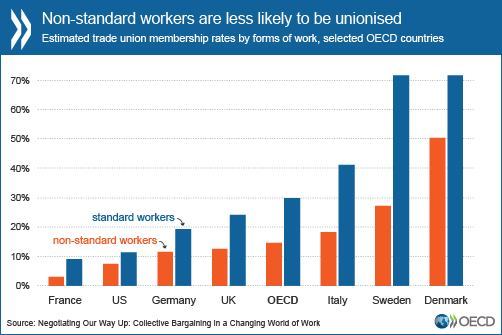Collective bargaining and worker's voice are key labour rights but can also improve labour market performances, according to new OECD findings. Yet both these rights are under pressure from the general weakening of labour relations in many countries and the rise of new and often precarious forms of employment, according to a new OECD report.
Negotiating Our Way Up: Collective bargaining in a changing world of work says that the share of workers who are union members has fallen sharply across OECD countries, from almost 30% on average in 1985 to 16% in 2018. Membership is even lower among workers in non-standard jobs, such as people on fixed-terms contracts, temporary workers, or own-account workers, who are 50% less likely than workers in open-ended contracts to be unionised. The share of workers covered by a collective agreement has also shrunk from 46% on average in the OECD in 1985 to 32% today. However, collective bargaining is essential to help workers and companies adapt to changes in the labour market and ensure an inclusive and prosperous world of work, says the report. And new trends affecting the world of work, such as the fragmentation of production processes, and the gig economy should give social partners a chance to revitalise collective representation and actions. |
"The world of work is in flux," said Stefano Scarpetta, OECD Director of Employment, Labour and Social Affairs, at the launch of the report in Berlin. "More than ever collective bargaining, when based on mutual trust between social partners and designed so as to strike a balance between inclusiveness and flexibility, can help companies and workers respond to demographic and technological change and adapt to the new world of work."
"The OECD report is both a confirmation and a spur for action," said Björn Böhning, State Secretary at the German Federal Ministry of Labour and Social Affairs. "In many points, it confirms our awareness of how much German collective bargaining is under pressure, and how great the political need for action is. Furthermore, the report is an incentive for us to implement concrete measures swiftly, in order to strengthen collective bargaining. With our proposals for collective bargaining and for the expansion of corporate co-determination, the ministry wants to contribute to raising the significance of social partnership once again. Even in the new and changing world of work - for example in the platform economy - we stick to this mantra: "We want fair competitive conditions, good work and social security for all."
In that regard, having in place mechanisms of wage co-ordination, allowing social partners negotiating for different groups of workers to establish a common bargaining strategy and to follow common wage targets is key. This helps ensure that unions and employers take into account the business-cycle situation and the macroeconomic effects of wage agreements on competitiveness. Wage co-ordination is quite strong in countries such as Austria, Denmark, the Netherlands, Norway, Sweden and partly Germany and Japan.
The report also highlights that the best outcomes in terms of employment, productivity and wages seem to be reached when sectoral agreements set broad conditions but leave detailed provisions to firm-level negotiations. This is the case in countries such as Denmark, Germany, the Netherlands, Norway and Sweden.
Looking ahead, making the most of collective bargaining in the future world of work will require some governmental intervention, notably to provide access to collective bargaining rights beyond standard employment. Enforcing the correct classification of workers and fighting the misclassification of workers as self-employed when they are actually in a situation comparable to that of employees is an essential first step. But even with proper classification, a potentially growing number of workers will be in the grey zone between dependent employment and self-employment, and labour and competition regulations also need to be adapted to ensure that these workers have access to collective bargaining rights.
The report is available at http://www.oecd.org/employment/negotiating-our-way-up-1fd2da34-en.htm.







